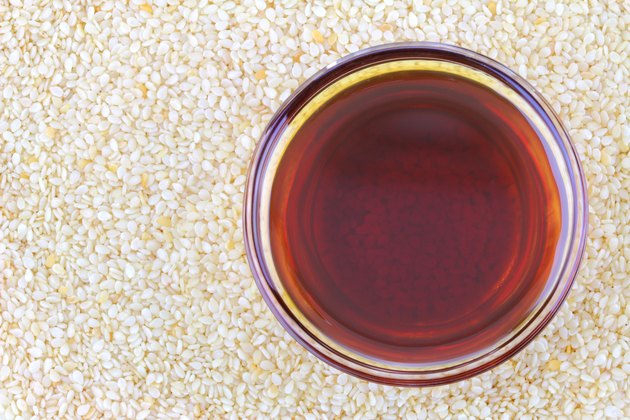Is Sesame Oil Healthy?
Fat serves a variety of roles in the body, including insulation and cushioning of organs. You can obtain fat in your diet through several sources, but oils of plant origin are generally healthier than animal-source fats because of their decreased saturated-fat content. Sesame oil, which is extracted from sesame seeds, is a healthy source of fat, with a small amount of saturated fat and large amounts of heart-healthy fat.

Calories
Sesame oil is pure fat, so it is high in calories compared to other foods. One tablespoon contains 120 calories, or approximately 6 percent of the total calories needed daily for someone who consumes 2,000 calories. All other oils contain the same number of calories per tablespoon, as they are also composed only of fat. Use sesame oil in moderation to keep your intake under control.
Unsaturated Fat
The fat found in sesame oil is mostly “healthy” fat; 1 tbsp. contains 8 g of monounsaturated fat, which is comparable to olive oil, which has 10 g in 1 tbsp. Sesame oil also contains some polyunsaturated fat, with 2 g in 1 tbsp., compared to 4 g in olive oil. Both types of fat increase “good” HDL cholesterol and decrease “bad” LDL cholesterol.
Saturated Fat
There is not a high amount of saturated fat in sesame oil, with 2 g in 1 tbsp. Olive oil contains the same amount. Saturated fat has been shown to increase risk of heart disease by increasing harmful LDL cholesterol and decreasing beneficial HDL.
Vitamins and Minerals
Sesame oil does not contain vitamins and minerals in significant amounts; 1 tbsp. contains only 0.19 mg vitamin E and 1.8 mcg vitamin K. Sesame seeds in their whole form, however, contain larger amounts of nutrients, with 88 mg calcium, 32 mg magnesium, 42 mg potassium and 9 mcg folate.


